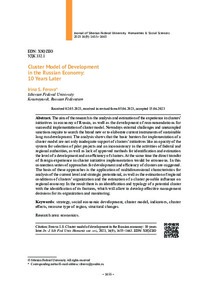Кластерная модель развития в экономике России: 10 лет спустя
Автор:
Ферова, И. С.
Ferova, Irina S.
Дата:
2023-09Журнал:
Журнал Сибирского федерального университета. Гуманитарные науки. Journal of Siberian Federal University. Humanities & Social Sciences; 2023 16 (9)Аннотация:
Целью исследования является анализ и оценка опыта развития
кластерных инициатив в экономике России, а также разработка рекомендаций для
успешной реализации кластерной модели. В настоящее время внешние вызовы
и беспрецедентные санкции требуют нахождения новых или совершенствование
существующих инструментов устойчивого долгосрочного развития. Анализ показал,
что основными барьерами реализации кластерной модели являются не только
недостаточная поддержка кластерных инициатив в виде непрозрачности системы
отбора пилотных проектов и несогласованности деятельности федеральных
и региональных органов, но и отсутствие утвержденных методик по идентификации
и оценке уровня развития и эффективности кластеров. При этом ошибочным будет
прямой трансферт зарубежного опыта реализации кластерных инициатив. В связи
с этим был предложен ряд подходов для оценки уровня развития и эффективности
деятельности кластеров. Основой этих подходов является использование многомерных
характеристик для анализа текущего уровня и стратегического потенциала, а также
для оценки наличия в регионе условий для формирования кластеров и оценки их
возможного влияния на экономику региона. В результате происходит идентификация
и типологизация потенциального кластера с выявлением его особенностей, которые
позволят разрабатывать эффективные управленческие решения по его формированию
и мониторингу The aim of the research is the analysis and estimation of the experience in clusters’ initiatives in economy of Russia, as well as the development of recommendations for successful implementation of cluster model. Nowadays external challenges and unexampled sanctions require to search the brand new or to elaborate current instruments of sustainable long run development. The analysis shows that the basic barriers for implementation of a cluster model are not only inadequate support of clusters’ initiatives like an opacity of the system for selection of pilot projects and an inconsistency in the activities of federal and regional authorities, as well as lack of approved methods for identification and estimation the level of a development and an efficiency of clusters. At the same time the direct transfer of foreign experience in cluster initiative implementation would be erroneous. In this connection series of approaches for development and efficiency of clusters are suggested. The basis of these approaches is the application of multidimensional characteristics for analysis of the current level and strategic protentional, as well as the estimation of regional conditions of clusters’ organization and the estimation of a cluster possible influence on regional economy. In the result there is an identification and typology of a potential cluster with the identification of its features, which will allow to develop effective management decisions for its organization and monitoring

